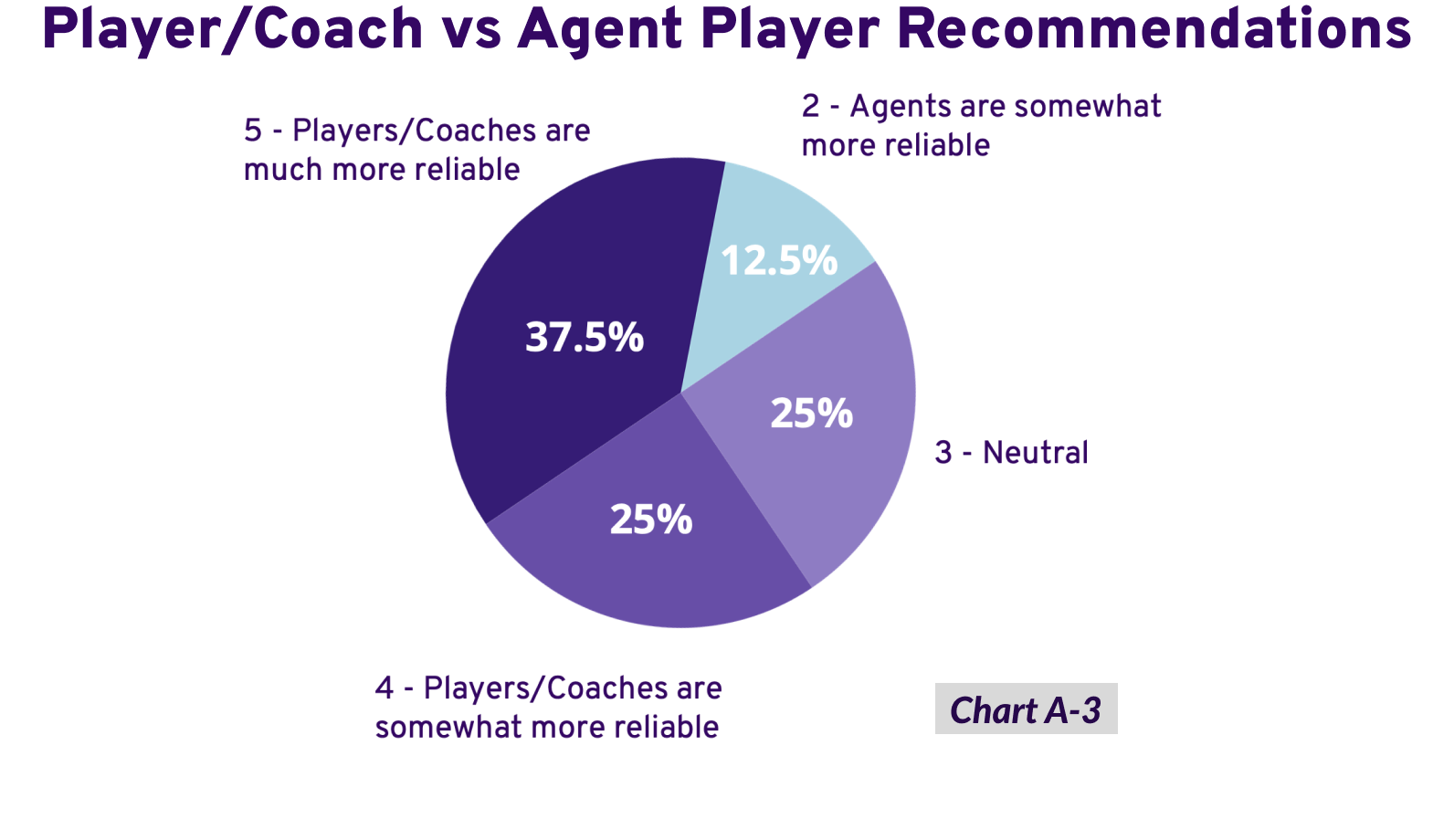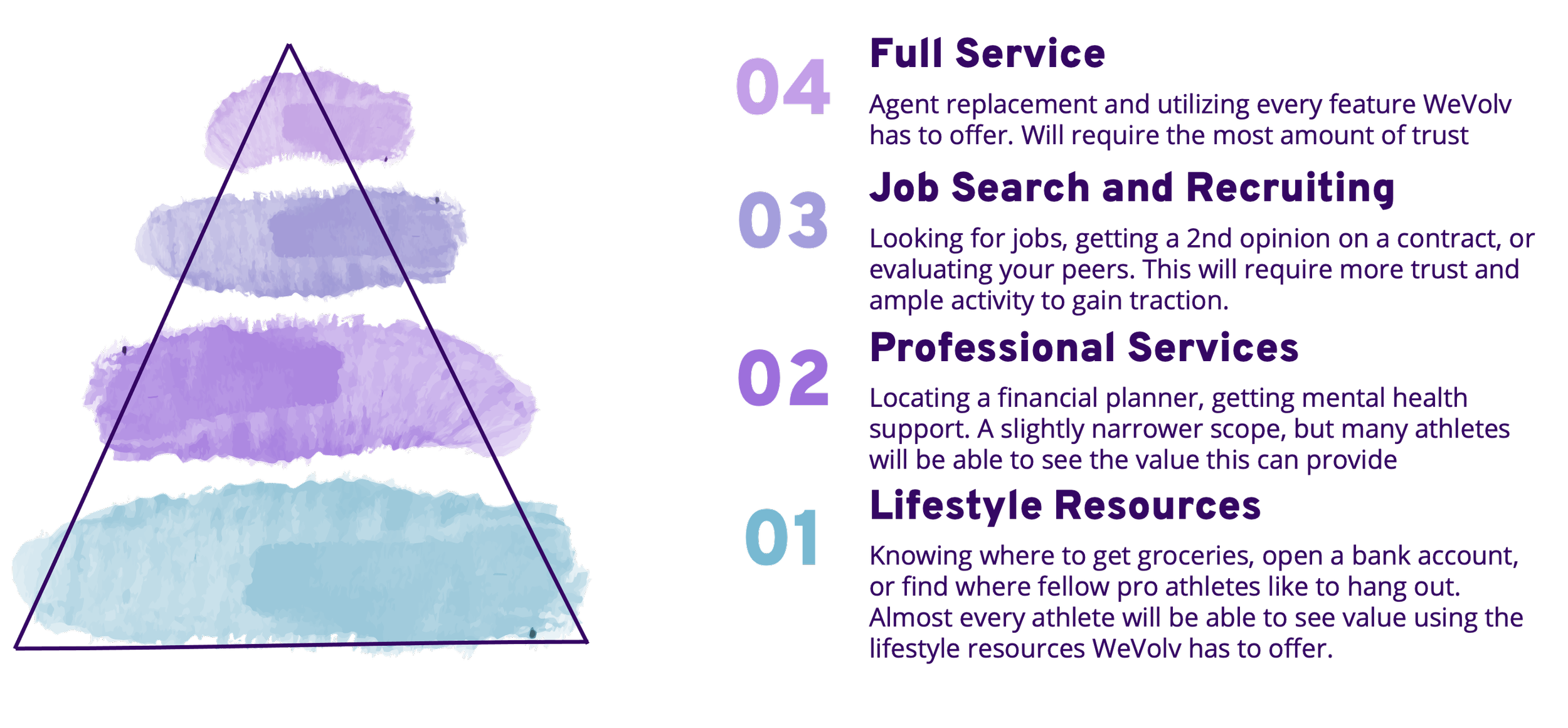
WeVolv
UNDERSTANDING MARKET ViabilITY for a professional and lifestyle resource based app for athletes
Scroll ↓
Background
The Client:
WeVolv is a digital marketplace and resources platform with the goal of enabling athletes to manage their lifestyle and career independently. They want to add transparency to a very opaque sports industry world, where many athletes struggle to have the resources they need to succeed or have full control over their own careers.
The Objective:
Conduct research to confirm market viability in the product and provide insights and recommendations based on the findings.
Deliverables:
Detailed research report and presentation explaining findings from the research and design recommendations for the app moving forward.
Research Plan
Research Goals:
Learn about WeVolv and those who benefit from using their services.
Understand the current customer experience to identify WeVolv’s value and potential pain points.
Key Questions:
Would players, teams & player associations be interested in a marketplace platform that allows players to shop for job opportunities and contract creation? And for teams, agents, and players to post those opportunities?
Is there interest in a digitally enabled contract creation system to be used outside of the traditional agent/player model?
What are the current trust levels with agents? Are agents being used because there is no alternative?
Are the stakeholders open to handling payments through the platform?How prepared are teams to engage with new technologies? What tech are they using currently?
Do teams find it difficult to know the true salary value of athletes they recruit? Would teams trust an athlete peer to peer talent endorsement feature to aid in their recruiting efforts?
Research & Exercises Performed:
Stakeholder Interviews
User Interviews
User Surveys
Secondary Research
Personas
Data Analysis
Stakeholder Meeting Summary
Communicating the Wevolv message. It is important to WeVolv for athletes to quickly understand the services and values they can offer them. Creating a brand message that encompasses who they are and the values they stand for.
Building trust. A main selling point of WeVolv is the trustworthy, supportive community. It is a project looking to shake up the market, and therefore building trust with its target market is critical to creating success.
One method they are currently using to get their name out there is through a WeVolv podcast. Providing content for athletes to learn as well as market their app at the same time.
Marketing. Currently there has been no paid advertising, it has been purely organic. The app plans to be exclusive and therefore will explore channels marketing through player unions and associations, as well as key advocates.
Competitors. There are competitors out there offering some of what WeVolv provides, however there is not another competitor currently out there who is offering everything WeVolv can do.
Exclusivity. WeVolv plans to be an invite only app. This will respect the privacy of athletes and help to provide quality over quantity in terms of service providers. Currently to gain access you need to be recommended through athletes.
Atmosphere. WeVolv wants to stay true to itself and not develop any kind of corporate feel. It needs to feel genuine and authentic to the sports industry.
Athlete Allegiance. Athletes currently get tied to private networks through their universities. Some agents and organizations want it to remain that way to keep athletes from having full control. Therefore. athletes no longer feel loyal to organizations, more so to the community created through players and staff.
Target Audience. WeVolv plans to initially target: Americans playing abroad with middle to lower income, graduated from major colleges, focusing mostly on basketball. Athletes who wanted to get into the NBA/WNBA but realize it’s not going to happen. Looking abroad to play in Europe is the next best option.
The Blueprint. WeVolv aims to act like a ‘Blueprint’ or resource for athletes who to play abroad. From providing lifestyle and professional service information, to job search, peer to peer evaluation, as well as navigating through contract creation and payment.
Agents. WeVolv is not necessarily trying to replace the added, but more importantly trying to add much needed transparency to the market. Athletes will be able to get their contracts reviewed through WeVolv’s legal support to ensure they are getting the best possible deal.
Language Barrier. One of the main concerns for the app is the potential language barrier. Players from all over the world playing in many different countries will require the app to be compatible in many different languages.
User Interviews
With a better understand of WeVolv and what they hope to achieve through this exercise, our team was now ready to start building scripts for both the interviews and survey. One of the main challenges we uncovered is that there will need to be unique scripts developed for athletes, coaches, managers, and owners to get relevant information that can be used for the project. In some cases, hybrid scripts will need to be created in situations for example where an athlete becomes a service provider, or an athlete becomes a coach.
Participants
Interview and survey participants were recruited to the team through a list of contacts provided to us directly from WeVolv. Given the sporting industry can be considered somewhat gatekept, and the short time frame to deliver results, the team stuck to conducting research from this list exclusively. Any coaches or managers who felt the language barrier would be too difficult to overcome was given the survey in place of an interview.
In total, eight (8) participants who completed an online video interview and an additional eight (8) participants who completed the survey. This gave a total of sixteen (16) participants to participate in the research stage.
Personas
click on each persona to enlarge
KEY INSIGHTS
The AGENTs Role
The role of an agent won’t be going away anytime soon, but there is an opportunity for change under the WeVolv landscape.
When going through the interview and research process one thing was clear, everyone is very opinionated on agents. Both their role in the industry and the experiences the have had. Some may have gotten the luck of the draw and dealt with great agents from the start. Others have found out the hard way and had to deal with agents only looking out for themselves. It’s no secret that agents can have huge impacts on athletes, coaches, and teams. How they navigate deals and relationships can determine which team players go to play for and how much the players make, and ultimately decide how it effects the team from a performance and financial standpoint.
You will hear many say you can’t trust all agents. Phrases like “they are only looking out for themselves” or “You never know if they are being honest” are just a couple that you routinely hear. And it is understandable. Many agents have a lot of players under management, so there is that possibility of conflict of interest wondering if the agent is truly finding the best placement for the player, or if it is the best placement for their business.
At the same time, agents can also provide a lot of value. They can be the reason a young player finds the right team that develops them into a superstar. It is also believed to still be the best opportunity for players to get the best contract possible financially. Not to mention it can keep a layer of separation between the team and player when discussing things like financials so to not sour the relationship.
Looking at the two charts below helps to explain this narrative a little further.
Chart A-1 highlights how participants felt about working with agents. A couple are happy, some are unhappy, while the bulk of the votes are stuck on the fence in the middle. Neither happy nor unhappy, and part of that is because there really isn’t another option. As a player or coach or manager, you know you need to have relationships with agents to find jobs and recruit players. Chart A-2 helps to take this story further. While the feelings are a bit mixed on working with agents, you can see when agents recommend players to teams, the ratings drop. Again, a majority of votes are more neutral, but the data trends to a more negative stance with more participants unhappy with the recommendations.
This can be taken a step further in chart A-3. Comparing player recommendations that come from a player or coach, those recommendations are much more reliable, with 62.5% of the votes. This goes to show that many feel the need to have their guard up around agents and can’t just take their word on a player. It is important for coaches and teams to still take the time to research players outside of agent recommendations to make sure this player will be a good fit for the team.
From all of this, there is an underlying core issue, and that is trust. There is a lack of trust between agents and players, agents and coaches, and agents and teams. Agents play such a pivotal role in a player’s career, and that cannot be left up to the chance of getting an agent that will truly have the player’s best interest at heart.
This creates an opportunity for WeVolv. They can begin to establish themselves in the sporting industry in areas where agents lack. But more importantly, they can use this as an opportunity to build trust with athletes, coaches, and player associations. By providing features like contract support, where a lawyer can help a player create or review their contract, WeVolv can provide reassurances to the player that the contract is safe, and in the best interests to continue in their career. As WeVolv growing in the community as a trustworthy service, it will force agents who are not acting in their client’s best interest to change their ways. Otherwise, they will start to lose clients and no longer be competitive in the marketplace with this added transparency.
Player’s Needs vs. trust
The need for player support is certainly apparent, and it won’t be a one size fits all package. Things like mental health and financial planning support are two of the biggest mentions, but there is an opportunity there to step in a provide help in many areas.
While all player’s needs will be individually unique, there will be different levels of support that will each require a certain level of trust.
Let’s look at WeVolv’s services to see the potential market scope and the level of trust that will be needed for athletes to utilize the services. Knowing and understanding the relationship between the value of service and the trust required can help direct marketing efforts to grow the WeVolv brand. Reference chart P-1 for the following levels.
01 Lifestyle resources
This might entail knowing where to get groceries, open a bank account, or find where fellow pro athletes like to hang out. Almost every athlete will be able to see value using the lifestyle resources WeVolv has to offer. Whether this is an athlete moving to Europe from the states, or someone that grew up one town over. Being able to easily find resources relevant to athletes provides immense amounts of value. This can greatly help import players settle into new areas more quickly, and ideally help them connect with teammates or other local athletes. This requires little risk, so only a minimal amount of trust is required from the athlete’s side. This will have the widest scope of potential athletes to market to.
02 Professional Services
Services in this category would be searching for a financial planner, getting mental health support, and everything in between. Athletes in this category are looking to seek help in areas that their team or agent may not be able to provide help for. This can be more common in lower leagues where budgets are much tighter. Almost every athlete will require some type of service in this category, so the scope of potential WeVolv users might be slightly narrower, but still very high. The main difference here is that it will require more trust than that of the lifestyle resources. There is a lot of value that can be provided to athletes, but there is also more to lose. The service providers on the app must be trustworthy companies and individuals that these athletes can rely on without question.
03 Job Searching and Recruiting
This includes looking for a new job, getting a 2nd opinion on a contract, or utilizing the peer-to-peer evaluation. In this part of the WeVolv app there is a big jump in the level of trust needed. Therefore, the scope of potential athletes will be smaller, and it will also require plenty of participation to make this area of the app useful. Contract review means the player is willing to share very personal details in hopes of receiving validation the contract is good or needs adjustment. That level of trust is going to take time and the athlete will want reassurances that there will be value in it. Good levels of communication and support, along with details of the process will help make the athletes feel at ease. Peer to peer evaluation can be a very useful tool for both athletes and teams. It helps athletes who want to try and find new opportunities. And can give teams a better insight into what a player is like beyond their statistics. One of the critical factors to this that was found in the research is the quality and quantity of the data. Participants want to know how this data can be validated, and do not want to have only one or two data points to go from. This will take time to develop, and coaches may see this a just one resource in a pool of many to make decisions on a player.
04 Full Service
Agent replacement and utilizing every feature WeVolv has to offer. As a result, this is going to require the utmost amounts of trust from the athlete. The scope for this level of service will be the smallest, and initially could take time to grow as WeVolv builds trust in the community. This type of athlete is ready to take control over their career and be self-sufficient. They will have to be fully convinced that WeVolv can provide the level of service to make them feel confident in finding new job opportunities and navigating the confusing world of contracts. This will not be for everyone. For example, a younger athlete fresh out of college looking to move overseas to play, will already be dealing with so much change. The thought of trying to navigate everything without an agent may be too much change at once.
Stats Don’t Tell the Whole Story
Statistics are everywhere in sports today. They can be used by agents, coaches, and teams to quickly reference a performance of a game or player. In a very digital world, there are so many metrics these days that it can be hard to make sense of it all to know what is most important. While all the statistics can be very helpful to improve performances on any areas in a player’s game, do they really tell the whole story when it comes to recruitment?
Research shows that teams are looking for the right mentality over good statistics. While each team might have different needs, many coaches are looking for players that they can develop to help fit into certain roles in the team. They want players who have a hard-working mentality that can bring positivity and a winning spirit into the team.
Chart S-1 shows a ranking of player traits that coaches find most important. One (1) being the least important, and five (5) being the most important when recruiting players for their team. As shown in the chart, teams feel most strongly about attitude, work ethic, their positional/role fit, and finally skills in that order. It might come as a bit surprising when so much emphasis gets placed on an athlete’s stats. Stats can be a big negotiating factor for agents and players to request better contracts. So why do coaches then value mentality over skill? It can be for multiple reasons. As just mentioned with price, many teams working on tight budgets can’t go out and sign someone who is averaging the most points in a season. They cannot financially make it work. Also, coaches want to know how players will handle themselves in certain environments. Can they handle the pressure when something is on the line? This is something that is a lot harder to teach, and coaches will feel more confident that if a player has the right mindset, they can help to further develop their skillset and expertise.
So how can a coach or team know a player’s mentality before signing a player? One of the most common ways today to try and find this out is either through word of mouth from agents, fellow coaches, or athletes, or by watching a lot of videos on players. However, many teams today, especially in the lower leagues, lack the time and resources for proper player recruitment.
This can be another great opportunity for WeVolv, specifically speaking the peer-to-peer evaluation and video highlight part of the app. If WeVolv can build trust in the marketplace to create this area of reliable data for things like mentality or playing style, it can open the door for so many opportunities for teams and athletes. Coaches who were struggling to find time to watch the latest videos can now quickly reference how other players and coaches rate this player, and what type of qualities they possess. That can then be affirmed through any highlights the athletes tag themselves in on their profile. This has great potential to streamline the recruiting process for teams, as long as the data in the app is genuine and trustworthy. Recommendations
Recommendations
01 Simple, Visual User Interface
WeVolv offers to be an all-in-one solution for athletes to manage their lifestyles and careers. That also means is that there will be many features within the app, creating the possibility of information overload or clunky navigation.
To help prevent a high learning curve to onboard new athletes onto the WeVolv app, it is critical to take the time to develop a user interface (UI) that makes simplicity the main focus. Taking the time to create all these amazing features could fall short in the end if athletes don’t have clear direction of how to get from point A to point B.
One step to take to help with that is to focus on the user journeys. Map out possible user journeys to gain a better understanding of what users will expect to see, and test extensively. Athletes have busy schedules, so the quicker and clearer they know where to go, the better the chance they will want to continue using the WeVolv app.
Another opportunity with a simple UI is to help get past language barriers. This was a concern for many participants during our research, and rightfully so. Players from all over the world will be competing in many different leagues, which means a lot of different language possibilities. It will be difficult to roll out support for the app in many languages from the start. One potential work around for this is to focus more on visuals and minimize the amount of text. Images and visuals are universal, it doesn’t matter what language a user may speak to be able to understand it. Creating a visually focused app will create simplicity and give a better chance for a user to understand where to go, even if they only have a minimal understanding of the language the app is in.
02 Build Trust
One of the most important aspects for WeVolv to be successful is to build trust in the marketplace. Outside of maybe the lifestyle resources, no athlete is going to want to share personal details like their contract or feel comfortable reaching out for mental health support if they do not trust WeVolv to deliver a secure experience.
While WeVolv is in its early stages, it is important to connect with athletes as they get to experience the app. Offer as much support as possible to make them feel comfortable using the app and gain valuable feedback on how to improve. Easily accessible ways for athletes to communicate this to WeVolv can help to provide reassurances.
Another way to build trust is by finding the right spokespeople. Traditional marketing isn’t going to work to gain awareness of the brand. Instead, find someone who aligns with WeVolv’s values and what they stand for. Someone who believes and trusts in the brand and who is connected in the target market. That can immediately provide an impact and make players feel comfortable enough to try WeVolv.
Within the app, consider things like badges so athletes quickly see trustworthy services. For example, a ‘former player’ badge lets an athlete know they might understand their situation better or ‘top rated provider’ shows that the provider is already trusted by some of their colleagues.
03 showcase wevolv’s value
For athletes to determine the value they can get out of WeVolv, they need to experience. Because of that it is important to get the WeVolv app into as manage hands as possible.
Whether it be players, coaches, services providers, or associations, any eyes on the WeVolv app will help to showcase the value it can bring. It also gives the opportunity to get feedback on the performance of the app, and any chances to improve upon or areas to focus. At the end of the day, research will only get you to a certain extent. Once the app is out in the open, the market will help dictate the direction it goes.
While users may be reluctant to try features that requires high levels of trust, focus can be put onto the more entry level core features to create that initial connection with WeVolv. The more they use it, the more they will see the value and begin to explore into other features offered by WeVolv.
Final Thoughts
This has been an excellent experience to get to learn more about the sports industry and what the needs are for athletes on both a professional and personal level.
The client’s have been happy with the research and insights provided to them. One of the pieces of research they found especially helpful was the levels of trust diagram. The idea behind it was to help create a hierarchy within the app of the features, as well as the potential size of the market so that they know what areas to focus on and prioritize when growing the user base.




